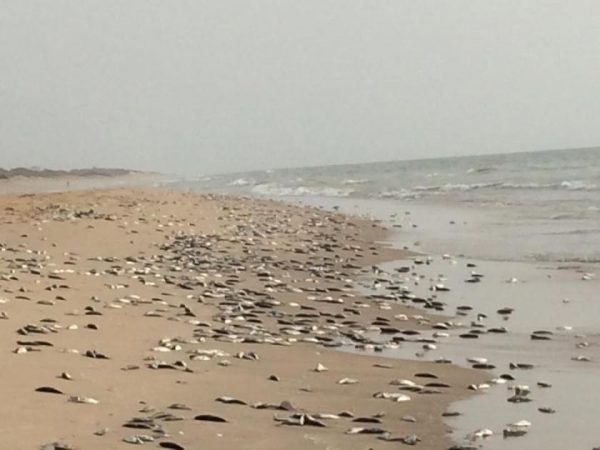
(JollofNews)- This article is aimed to contribute to the ongoing concerns of Gambian about over exploitation of our national resources notably the fisheries resources. On the contrary, this is not in any way suggesting that we should not rise up to stop unlawful acts detrimental to our coastline communities and the nation as a whole nor is it in defence of any Chinese company purportedly responsible for destruction of the natural resources.
Rather it’s to present analysis of national data on fisheries and fish resources as well as synopsis of interviews conducted with some community members of Gunjur and Golden Lead Import & Export Company Ltd factory workers.
The Gambia artisanal sector creates employment for an estimated 200,000 Gambians, 70 % of which depends on the small pelagic species for livelihood. The small pelagic species for which data is available include Sardinella Aurita – Yaboy Maroc, Sardinella Maderensis-Yaboy Tass, Ethmalosa Fimbriata- Kobo comprising the sardinella species; Decapterus spp, Scomber japonicas and Trachurus trecae. The total production of this species was estimated at 45,294mt in 2016 with sardinella species accounting for 88%.
Fish by nature are migratory, small pelagic fish and other fish within the Gambian waters traverse from Moroccan waters in the north to Congolese waters in the south. Fish surveys have revealed that small pelagic resources are concentrated in the waters of the North coastal countries (Morocco, Mauritania and Senegal) in the Months of May, June and July and migrating to the south (The Gambia and Southern Senegal) in July, August and September) and further south in September and October. Therefore catches from Senegal is higher than that of The Gambia.
To what extend has the Gambian small pelagic fish resources been exploited?
The potential pelagic fish stock in The Gambian waters ranged from a low of 101,000 to a high of 510,000mt from 1992-2011, averaging about 191,000. Catches/supply of small pelagic on the other hand; ranged from 3,240mt to 45,294mt from 1981 to 2016 with an averaged production 19, 000mt indicating an unexploited potential of about 172,000mt.
Therefore licensing of fish processing factory to that stimulate demand for small pelagic species is an option to maximize the benefits of our fish resources for poverty alleviation and fisheries sector development. Per capita fish consumption is estimated at 25kg per person alone coastal areas and 9kg for inland communities averaging 17kg per capita per person nationally giving rise to a domestic demand for fish at 32,432mt (72% of supply)in 2016.
This scenario is changed with registration of Golden Lead Import and Export Company to process Sardinella species with an annual average demand of about 108,000mt from 2015 onwards, pushing the total demand (domestic and industrial) for small pelagic fish close the carrying capacity of 191,000mt per annum. This clearly shows that Golden Lead has to outsource some 88% of their processing demand from the sub region to operate at optimal level.
The new Gambia and HE President Adama Barrow government should do all within its powers to increase domestic supply to be self-sufficient. I believe this is the untapped potential of the fisheries sector that the new government under the leadership President Barrow planned to exploit in the coming years as highlighted in several of his speeches.
From the above exposition, it is rational and strategic to allow fish processing factory to stimulate demand whiles for fish in our case it happens to be Golden Lead Company and Chinese.
This is the best option and aligned with ANR policy and GAIP for we cannot afford to increase supply first and think of what to do with over supply; that situation would have been worse than the present appalling environmental situation along the our coastlines being reported in the social media and much more difficult to control.
What caused the present seemingly national security threat?
A review of the claims in the social seems to suggest that it is Golden Lead Company that is registered to fish in our waters and dumping the excess all over Gunjur and Kartong area. It should be noted that the company is yet to be engaged in any fishing activity and has the data shows they is in fact depending more (88% of supply) on the sub-region for their supply than the Gambia and put to rest the over exploitation of our fish resources to rest.

Secondly, as can be gleaned from the pictures of trucks either dumping or loaded with fish no rational business will register to fish in Gambian waters, but land in Senegal, hire trucks to transport the fish to Gunjur when you can go straight to your factor and reduce cost.
The company has been operating since 2015 with minimal dumping with minimal environmental pollution. The escalated environmental pollution causing people to be sick in recently is reportedly caused by increase in the number of registered fishing boating targeting to supply the factory due to a ban on Senegalese fishing boat supplying fish processing factories in Mauritania over the years. Others attribute the situation to overnight fishing whereby fish caught earlier get rotten before landing.
Considering that fish is being brought by sea and land tons and tons got rotten and unacceptable to the factory. Then question becomes who own this rotten fish being dumped? Is it the people who brought the fish and have no further use of it dump or the factory for failing to purchase all the fish brought and therefore should close business?
My take is that it’s a collective responsibility of the all stakeholders particularly the beach management committee, the community and to some extent the factory for being present and the government for allowing the factory. The beach management committee is responsible of coordinating and registering boats to land on their beach for a fee.
The community for allowing illegal dumping in their community knowing that the government designated dumping site is situated in Brikama and seeing a truck dumping at a wrong site and the only thing you can think of is to take a picture for social media complain what is difficult to control are those dumping in the sea and being washed on the beach.
Mitigation measures suggested include: 1) grouping the boats and introducing turns to reduce supply 2) Ban overnight fishing as in Senegal 3) boarder police to stop all vehicles carrying fresh fish from entering the country 4) the navy to monitoring illegal dumping in the sea.
To conclude it be stated that the Chinese company establishment in the community of Gunjur has benefited the community in terms of direct employment of youths at the factory. The issue of how much they are being paid can better be addressed at policy level by legislation minimum wage law rather than targeting only the Chinese employers based on their reported character elsewhere.
A far more additional employment is created for those offloading the fish, earning for this group ranged from D1, 000.00 to D4, 000.00 per day compare this with the government integrated pay scale. Also the presence of the factory has increased the earns for the beach management committee as they collect D3.00 from each boat landed as well as petty vendors earning their livelihood from the beach not possible before the establishment of the factory.
Most importantly for the country to increase employment in the fisheries sector both processing and fresh fish exports have to increase talk less of improving the nutritional status of the citizens. The social media claims though outrageous, have raised important research topics for UTG student and environmental economist to show the extent of economic losses due to environmental degradation compared against gains as long has death is yet to be reported.
However, with available information on the cause of the situation have no doubt that the situation can be corrected without resorting to closure of the factory has the country needs this type of heavy investment which compete less with what can be left entirely for the citizens called FDI take a walk along Jimpex road and Kairaba avenue.
By Lamin J.S. Fatajo





Common sense approach; Beggars the quote>>”Don’t shoot yourself in the foot.”
Amicable solutions based on dialogue and good will.
Well done to the author;
This author naturally goes in for some sort of common sense approach in this sensitive case, having regard to its complexity. Having read Mr. Jobarteh’s original article on the matter sometime last week (15th May 2017) as well as Mr Darboe’s perspectives about it a couple of days ago. These articles expose a couple of unfortunate tendencies that do pose serious threats towards the sustenance of our new-found democracy.
The most serious among these being the possibility of civil servants and politicians receiving bribes from the owners so that they in return turn a blind eye to serious violations of our environmental laws.The other being the risk that correct procedures had not been followed prior to the establishment of the plant. Both risks should be thoroughly investigated with a view to putting in place procedures that have a in-built capacity to avert such eventualities in future.
Having done that, a further step could be reviewing the existing legislation in the area so as to ascertain as to whether or not these are “fit for purpose” in light of the crisis at hand.
Following this, possible new legislative measures could be introduced to take care of future cases. As I am confident that very few foreign investors shall be averse to helping The Gambia realize its development goals, the new government could further exploit this goodwill by imposing “tailor-made” charges” on certain imports a la AU’s new charges on foreign imported goods in member states. The proceeds of this can then be invested strategically and exclusively in the educational, infrastructure development and health sectors. Thus even if some of these foreign investors later turn out not to be the right type for our country, our country will keep on reaping the benefits of their presence on Gambian soil hopefully for generations. Call it a “targeted taxing strategy” if you will – but it does work. Another targeted taxing strategy could literally have as its main goal: “Making it expensive (uneconomic as it were) for the environmental polluter to pollute our environment”. Yes, such an approach has already been used in practice with great success in a number of jurisdictions the world over.
Indeed with some creative thinking we as a nation shall within a relative short space of time be in a position to do away with budgetary support from the international community.
The article appears supportive to the Factory and the owners and calls out the illegal dumping of rotting fish{ at sea or on land } that the factory { quite rightly} rejects;
It then places some responsibility on the community policing mechanisms.
The photo’s of the pipeline and the rotting fish washed up on the beach and the truck dumping its load>>>appear to be “Red Herrings”
A free exchange of interest/ should lead to an amicable solution, without recriminations, or conflict or loss of substantial foreign investment and livelihoods.
Mr Scales, thanks for the comments above.
However, I think we must agree to disagree on this point … indeed, we need more smart “charges” (which do not need to be high (between a percent or two could do) in future in order to finance our development needs. For the benefit of both long-term investors and the taxpayer.
Yes, a well-educated and healthy work-force not to mention good infrastructure in general is good for both parties. This combined with legislative measures that are fit for purpose in this regard will do wonders in the medium to the long-term.
Mike,
THUS’The photo’s of the pipeline and the rotting fish washed up on the beach and the truck dumping its load>>>appear to be “Red Herrings”
Mr Mike get serious! Can you certain what is being dischange?
The photo clearly shows the layout of the pipe. Its a dischange pipe towards the sea or ocean.
In short, That constituate dumging. A far more damaging aspect.
Why is the pipe there where it is??? Mike?
Read the latest posting on the subject today on Jollof News.
Mr Manneh; I would not wish to bring discord to our mutual admiration, but only to suggest the greatest assets The Gambia is presenting to international investment is low overheads and a willing if limited skilled workforce___ which equals enhanced productivity.
Productivity The Free world has lost when compared to– firstly the Japanese invasion of the 70’s and 80’s and again now with the Chinese { far east ‘} invasion of the past 10 years.
This has resulted in the West adopting pay freezing and an austerity programme to assist returning to a competitive realignment, accompanied by new policies that moot protectionism. Protectionism goes against all free market principles that modern Western economies were founded on. But hard times call for hard measures. Globalisation has proved a difficult concept to manage for well established economies.
Africa could well be the third wave invasion if it can find sound long term economic policies to match the previous two Far East economic invasions. If that happens as I am sure it will later rather than sooner…You will observe a significant rise in wages and living standards for all,, rising and matching the modern consumer economy.
Yes I agree legislation can defend all against profiteering, carpetbagging and any assault upon the native environment.
I am sure Gambia has such people who can construct such policies/ You should be one of them.
Just a few lines for Mr Scales aimed principally at clearing the air. By the way, thanks for the compliments above!
There are a number of signs that the two of us have for some some reason misunderstood one another on the matter of “foreign investments into The Gambia”: To the best of my knowledge, there is nothing in the above articles indicating that I am against it, at all. On its importance for the country, we do agree totally. I am so sorry I did not make this clear enough from the outset!
However, as a trained professional, when it comes to such issues, I admittedly have a tendency to put more efforts in our common search for viable solutions to the problem on legislative ways and means of preventing, or minimizing the risk of, recurrence in future, not least in a globalized world like ours. In such a world, I am confident that employing creative ways of averting abuse is the surest way forward. Not least since developments in global terms are moving fast.
Remember, even in developed jurisdictions like the UK and EU member states corporate tax policy units of large corporations enable these to operate in a country for decades without paying corporate income tax … and I must say they have been very good at it lately. Hence the need for “a “regime” of smart charges” so as to protect ourselves from the ruthless elements amongst them, who in some cases operate on African soil for decades without either benefiting host communities or paying income tax. The end result of which is the mass poverty on African shores that has to be dealt with by members of both my generation and the coming ones. Herein lies my insistence that smart and creative charges are the way forward for poor mother Africa in her efforts aimed at defending her integrity in the face of such nasty assaults.
While I endorse Mr Saikou Manneh’s common sense approach to analyzing the Golden Leaf Fishing Company’s conundrum, I must add that policy guidance and what obtains on the ground on The Gambia present different kettles of fish.
In support of exports to the European Union (EU), The Gambia, just as all other seafood exporting countries, must tailor trade policy and guidelines to meet EU mandated regulations and best practices. The EU has also had a long standing policy of endorsing in-country regulatory and quality management bodies that can append their stamps of approval on products destined for export to the EU. However, the EU also expects these entities to meet defined international standards at the minimum. A verification/validation process is put in place where EU inspectors may visit processing and/or packaging sites at random for the object of validating practices employed.
I cannot speak for the regulatory bodies in The Gambia but what I can offer as a private operator and a quality management expert that worked with the EU over the years is that what’s on the books in The Gambia has perennially been a far cry from what obtains on the ground with food service entities. The result is that EU and foreign inspectors have had to bend over backwards to accommodate Gambia based enterprises that are quite often caught cutting corners to save on operating costs or are outright incompetent at meeting regulations governing product handling, standards of hygiene, packaging and labeling among other requirements.
What The Gambia must do is to get the folks with the requisite experience and integrity to evaluate possible violations and deficiencies in practice with a view to speak for government and also craft sensible and internationally compliant regulations.
Ministers of state that may not be au fait with the basic sciences or the rudimentary operating guidelines must not take it upon themselves, mostly without adequate expert consultations, to speak on behalf of government on technical matters that may impact the overall perception and goodwill of community based food processing outfits! The outcome is usually an ill-informed person shooting themselves in the foot and then work feverishly to tidy the mess!
The new government must look to tidy up the regulatory framework governing environmental and food quality management regulations to fit this new era and not leave matters to chance, unscrupulous investors and the Bismilahi, Insah Allah and the Alhamdulillahi crowd.
What appears in some of the photos associated with the Golden Leaf operations such as the red colored water appears to be some form of dye inserted into a body of water trapped in a cove. It is not so common to find that amount of blood emanating from a seafood processing plant and even where this was the case, there are measures that can be put in place to minimize the impact of the effluent. Especially where this is a case of point source pollution from the factory/processing plant.
By the way, Gambians can go back in history to the days of large seafood outfits such as the Swiss Cold Stores (Marche Banjul), National Partnership Enterprises (NPE), Seagull Fisheries, Gambia Marine/Pelican Seafood, Euro Credit and others to determine that environmental guidelines have ever been observed or that Gambians have ever benefited from LIVING WAGES. There’s gainful employment versus employment that is nominal and just that. That’s what a government that offers a pittance of wages and salaries must look to correct in earnest for the benefit of Gambians.
First take the log out of their own eyes before they seek to take the speck out of the other person’s eye!
A review of labor laws would be a step in the right direction. It is time for meaningful changes aimed at protecting our environment and national pride for posterity!!
I thank Andrew for the eye-opening comments above, which I do endorse.
In particular, the suggestion that ministers be equipped with professional advisory bodies before making policy decisions on technical matters. That is the standard routine in mature democracies which we undoubtedly need to adopt as a nation in order to prevent such scandals from happening henceforth.
Likewise, I do agree with you that the current salary levels of civil servants have to be thoroughly revised before embarking on wholesale anti-corruption drives within the civil service. History teaches us that such an approach has worked well in northern Europe, hence I see no reason why it should not work in The Gambia. Indeed, the two complement one another. When civil servants have salary levels that enable them to provide a decent standard of living for their families and still have a surplus for saving, naturally the propensity for them to engage in corrupt activities declines. To boot, that per se could serve as an incentive for some highly skilled Gambians abroad to return home in the nearby future. A win-win situation so to speak.